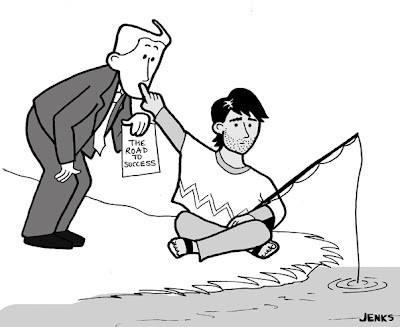 Have you heard the story about the fisherman? If not, you’re not alone. It’s something you need to hear. It very well could change your life.
Have you heard the story about the fisherman? If not, you’re not alone. It’s something you need to hear. It very well could change your life.
Unfortunately, most people take the story at face value for the moral you’re supposed to get from the story. I want to challenge you to think about the whole story while you’re reading it. Don’t just think about what the moral of the story is supposed to be.
Now, on to the story.
Table of Contents
The Story of the Fisherman
An American investment banker was at the pier of a small coastal Mexican village when a small boat with just one fisherman docked. Inside the small boat were several large yellowfin tuna. The American complimented the fisherman on the quality of his fish and asked how long it took to catch them.
The fisherman replied, “Only a little while.”
The American then asked why didn’t he stay out longer and catch more fish?
The fisherman said he had enough to support his family’s immediate needs.
The American then asked, “but what do you do with the rest of your time?”
The fisherman fisherman said, “I sleep late, fish a little, play with my children, take siestas with my wife, Maria, and stroll into the village each evening where I sip wine, and play guitar with my amigos. I have a full and busy life.”
The American scoffed. “I have an MBA from Harvard, and can help you,” he said. “You should spend more time fishing, and with the proceeds, buy a bigger boat. With the proceeds from the bigger boat, you could buy several boats, and eventually you would have a fleet of fishing boats. Instead of selling your catch to a middle-man, you could sell directly to the processor, eventually opening up your own cannery. You could control the product, processing, and distribution,” he said. “Of course, you would need to leave this small coastal fishing village and move to Mexico City, then Los Angeles, and eventually to New York City, where you will run your expanding enterprise.”
The fisherman asked, “But, how long will this all take?”
To which the American replied, “Oh, 15 to 20 years or so.”
“But What Then?” Asked the fisherman.
The American laughed and said, “That’s the best part. When the time was right, you would announce an IPO, and sell your company stock to the public and become very rich. You would make millions!”
“Millions – then what?”
The American said, “Then you could retire. Move to a small coastal fishing village where you could sleep late, fish a little, play with your kids, take siestas with your wife, and stroll to the village in the evenings where you could sip wine and play guitar with your amigos.”
What Did You Get From the Story?

The whole point of the fisherman story is to open your eyes. There are other options besides what society teaches us.
If you’re like me, the first time you read the story of the fisherman, you start to wonder if you’re doing things the right way. The first time I read the story, I was working at an 8 to 5 desk job. The life of the fisherman sounded so alluring. Wouldn’t it be awesome to kick back and enjoy life a bit more while still getting everything I need?
Of course, after a bit of thinking, you come to the realization that you probably can’t easily take your life to the point of that of the fisherman. If you didn’t work as much, you wouldn’t get to live in your house with your new car and eat out at restaurants multiple times per week. Instead, you’d have just enough to get by. It would be on a very basic level, but you would be rich with time, family and friends.
The more I thought about it, it seemed like living the life of the fisherman would be impossible for me. That said, it was still very alluring.
Why the Fisherman Story is So Alluring

So we’ve established that the fisherman story is alluring to so many people. But why? Why does the life of minimal work and just hanging out with friends and family appeal to us?
For some people, the lifestyle appeals to us because we hate our jobs. If you don’t do something you love, work can be a forty plus hour trudge through every week.
For others, money is a source of major pain in their lives. Whether you’ve taken out more debt than you can realistically afford or you simply have a serious case of FOMO, most people find something to be miserable about in their financial lives. We always want, bigger, better and more expensive things and experiences. Once we obtain them, the dreams keep growing.
The fisherman seems so content just going out and fishing for enough food to feed his family and take care of his basic needs. He doesn’t want the bigger and better things that so many of us dream of. The fisherman doesn’t overextend himself to where he owes others large sums of money. He is self-sufficient.
You Can Live the Life of the Fisherman
Living the life of the Fisherman is completely possible. It just goes against everything we’ve been taught in our society. Yes, you could find a job that allowed you to work less than full-time. You could earn just enough to be self-sufficient and support your family. You’d have to live a frugal lifestyle in a low cost of living area, but it could be done. Another way this could be accomplished is by having extremely high paying work. You wouldn’t have to be as frugal, but keeping high paying work on a part time basis might be difficult.
Of course, if you lived this lifestyle, you’d be setting yourself up for financial ruin. If anything goes wrong, your just getting by budget could be wrecked. You’d essentially be living paycheck to paycheck with nothing to fall back on. If you got injured or sick and couldn’t work, you’d likely go into debt. Then, you’d have start working more hours when you do get better to pay off that debt.
The American Investment Banker Actually Has Some Good Points
Alternatively, you can do what the American investment banker suggests. You can work hard for years and build a business to sell. You could have money set aside for emergencies and have all of the fancy things you could afford, but you’d likely be spending the majority of your time working on your business. Building a business big enough to sell for millions doesn’t usually happen working a few hours a week like the fisherman did.
Here’s another option. You can work in a traditional job for decades and invest a significant portion of your income until the earnings from your investments replace your income. Depending on how much you earn, how much you spend, and how much you invest, you could walk away after just a couple decades.
The Reality Is Somewhere Between the Fisherman and the American Investment Banker
 As with most things in life, neither the fisherman nor the American investment banker have everything figured out.
As with most things in life, neither the fisherman nor the American investment banker have everything figured out.
The fisherman provides for his family for now, but what will happen down the road? While it is possible the fisherman will be able to fish until the day he dies, it is unlikely. The maintenance required on his boat and the physical nature of his job means one day he will no longer be able to fish. What will he do then? If he only worked enough to provide for the present, he’s left a huge burden on his children because they’ll have to support the fisherman in his old age.
The American investment banker has some flaws as well. Not all businesses are able to be sold making their owners rich. If the business had an unexpected downturn for reasons that may or may not be in the fisherman’s control, he could have worked for decades to build a business that nets him nothing. The investment banker could learn a lot about enjoying life, family and friends from the fisherman, as well.
Balance Is the Key
In reality, you need to be somewhere in the middle. Find a job you love so going to work isn’t such a chore. Earn a decent income, make sure you spend less than you earn and invest the rest for your future.
If you’re smart, you can take breaks along the way. Take some time off between jobs or take a sabbatical from work. Try your best to leave the worries of your job at work so you can be present in the time you have off in the evening and on the weekends with friends and family. What’s even better is finding a job that actually respects your time off, gives you plenty of vacation and keeps you from working overtime just for show.
Why is this story important?
The story about the fisherman and businessman is an important lesson because it challenges the traditional idea of success and happiness that is often associated with wealth and material possessions. In the story, a fisherman leads a simple and contented life, spending his days fishing and spending time with his family. When a businessman suggests that the fisherman should work harder to catch more fish and expand his business, the fisherman questions why he would want to do so when he is already happy and fulfilled.
The story highlights the importance of prioritizing what truly matters in life, such as spending time with loved ones and pursuing hobbies and passions. It suggests that the pursuit of wealth and material possessions can often lead to stress, anxiety, and a loss of perspective on what truly brings us happiness.
Moreover, the story encourages us to reexamine our definition of success and to question whether our current pursuits align with our values and goals. It suggests that success is not solely measured by financial wealth, but by the degree of satisfaction and fulfillment we feel in our lives.
Overall, the story about the fisherman and businessman is an important lesson because it reminds us to prioritize our values and to focus on the things that truly matter in life, rather than blindly pursuing material possessions and societal expectations of success.